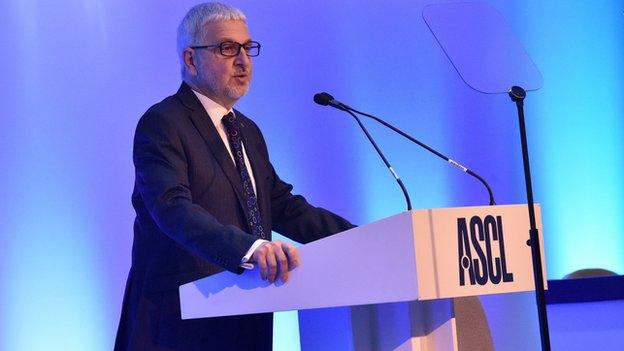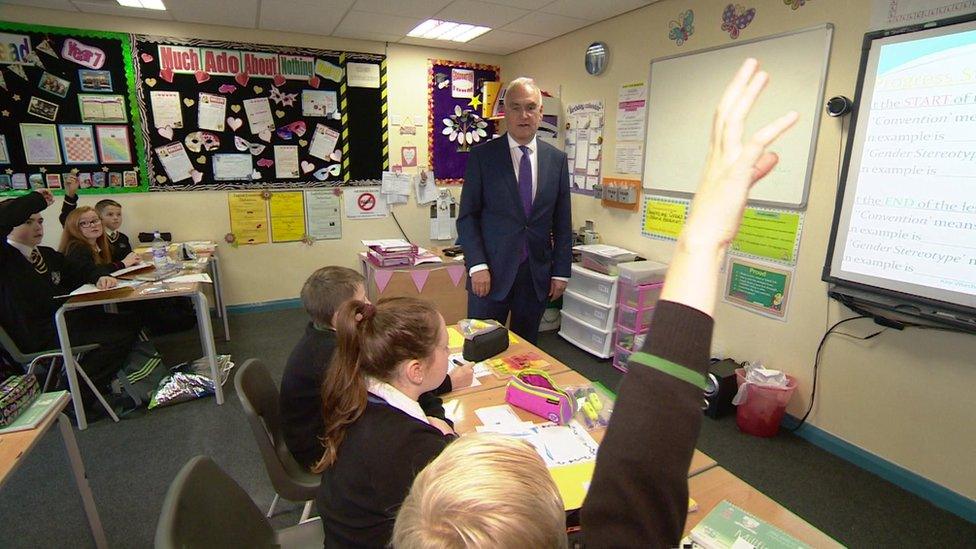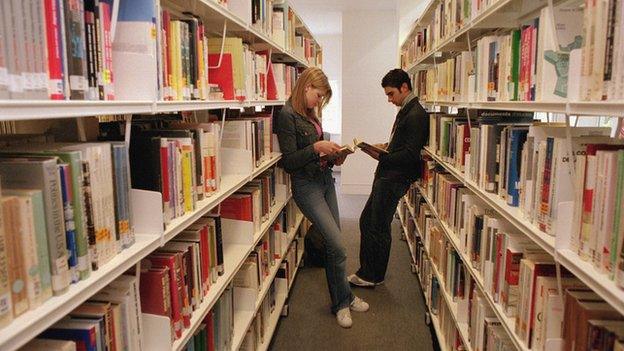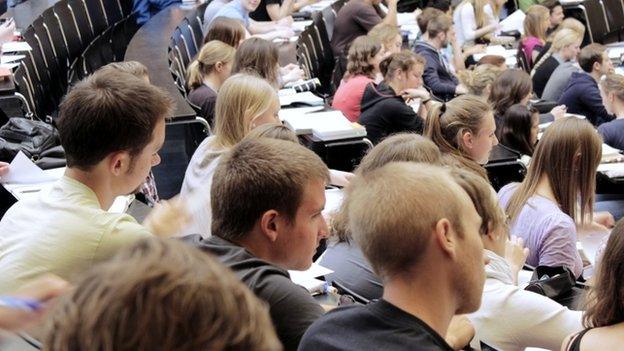Teacher shortage 'becoming a classroom crisis'
- Published

Tens of thousands of teachers leave the profession each year
"The word 'crisis' is not an exaggeration," says Brian Lightman, leader of the ASCL head teachers' union.
Mr Lightman, not usually given to scaremongering, is warning about the shortage of that most vital ingredient in a school - the teachers.
Schools cannot recruit the teachers they need - and for some posts, such as a head of maths, he says they are as "rare as hen's teeth".
And as one unintended consequence, schools are having to spend their already stretched budgets on recruitment agencies and "finders' fees".
The National Association of Head Teachers says a survey of members shows some schools are having to pay £10,000 to fill a single vacancy.
It suggests 59% of schools advertising for staff had "struggled" to find someone - and a further 20% had failed completely.

Brian Lightman says recruitment is becoming a severe problem for schools
Ofsted chief Sir Michael Wilshaw has warned this is having a "significant impact" on schools.
The watchdog's own figures say 50% of heads in affluent areas could not recruit enough good staff and that rose to 77% in the "most challenging areas".
And this meant 61% of heads in these poorer areas had to rely on "temporary" arrangements to cover for maths or science.
But why is there such a recruitment problem?
John Howson, visiting professor at Oxford Brookes and fellow at Oxford University, has been monitoring the teachers' job market for more than 30 years.
He says this is the worst recruitment problem since 2001-02, when some pupils had to be sent home because of a lack of staff.
Like any storm, it's caused by a combination of factors all coming together.

Graduates have more choices as the economy improves, making it tougher to hire teachers
The economy is picking up, so more companies are recruiting and that means more options for graduates.
Teaching is often seen as a safe haven in a recession. And when the economy improves, it becomes harder for schools to recruit and retain people
A study in the US this year suggested this pattern - and how teachers recruited in a recession were often better qualified and likely to get better results.
For the past three years, recruitment targets for initial teacher training have been missed. And Prof Howson says that with teachers facing further public-sector pay constraints, it is going to become even more difficult to attract new recruits.
And rather than more teachers in the training pipeline, fewer people entered initial teacher training in 2014 than in 2010.
Another complication is that a teaching shortage is not evenly spread.
There are particular subject areas that for many years have had difficulty - such as maths and science. And Prof Howson's analysis suggests that English teachers could also be in the "crisis" zone.

Teachers have complained about an excessive workload and inadequate pay
There are geographical pockets too. Prof Howson says Essex and Hertfordshire seem to have particular shortages.
There can be local deterrents in other parts of the country - whether it is over-expensive housing, poor transport links or an unattractive town. And tough schools can be a tough sell for staff who have a choice of jobs.
Prof Howson also warns of unintended consequences from teacher training initiatives.
The move to train more teachers in schools rather than university has created a supply of staff for those individual schools where trainees are learning their craft. These are often good schools and will hope to recruit from the ranks of their own trainee teachers.
There are also schools that benefit from the Teach First scheme to bring high-flying energetic young graduates into the teaching workforce.
But, says Prof Howson, such projects can leave other schools out in the cold, competing for what's left of a shrinking pool of teachers.

Ofsted chief Sir Michael Wilshaw has warned of the impact of recruitment problems
Ofsted says that 91% of head teachers in more challenging schools told them there was insufficient teacher training provision in their local area.
There have been warnings that the shortage is being exacerbated by so many teachers quitting the profession. Excessive workload, inadequate pay and complaints about endless political meddling have been among the reasons cited.
The National Foundation for Educational Research (NFER) has studied these trends. It found that in 2014 about 10% of the teaching workforce left the profession - about 49,000 people.
But this was not unusual for the past decade, when the "departure rate" has been about 9-10%.
Instead, the most substantial issue, according to the NFER, is that teaching numbers are failing to respond to the soaring numbers of pupils.
Cities such as London face a huge spike in the school-age population, creating a flurry of temporary classrooms and school expansions, with some primary schools having to almost double in size.
This all means schools will need more teachers than ever before.

Ofsted says 61% of heads in challenging areas rely on temporary arrangements for maths or science
So what's going to happen next?
Prof Howson says the problem is going to be even worse next year.
But Mr Lightman says he doesn't think any pupils will be sent home. Instead there will be a less public, but nonetheless corrosive impact.
There will be bigger classes and more lessons taught by people who are not qualified in that subject.

Teacher training places have been moved from university to schools
"The true situation will be masked. Even if you don't have a maths teacher, you put someone in front of the class. The vacancy is filled, but not with the right person," says the heads' leader.
So what should happen?
In the short term, it will mean more supply teachers. And there's a cost for relying on temporary staff. A survey from the National Union of Teachers suggested schools in England spent £733m last year on supply agencies.
It will also mean schools looking overseas for the staff they can't find in the UK.
Mr Lightman suggests it needs a strong offer to get more young graduates into teaching, such as paying off their tuition fee loans.
A former government insider said one of the difficulties for Education Secretary Nicky Morgan is that the current system, with much of the training delegated to individual schools rather than university education departments, makes it hard to push for a rapid increase in numbers.

Nicky Morgan says the number of teachers is at an all-time high
It's now a very diffuse system, with lots of individual training projects, which makes it much harder to "turn on the tap" for new recruits, compared with when teacher training was based on large numbers going through universities.
The study from the NFER also highlights the pool of tens of thousands of qualified teachers leaving the classroom each year.
They are not going for extra money - as the research shows most who leave education take lower-paid jobs elsewhere. And large numbers disappear into non-teaching jobs within education.
But how do you persuade them to stay in the classroom?
The Department for Education says it recognises the challenges for schools but the overall teacher vacancy rate is 0.3% and has remained under 1% for the past 15 years.
It also points out the number of teachers is at an all-time high, with 13,100 more full-time equivalent teachers than in 2010.
In response to the question of getting enough good teachers into areas such as coastal towns, the government has announced a National Teaching Service.
This will recruit a pool of 1,500 high-achieving teachers over five years who would be deployed to schools in areas with weak results.
There is a television campaign to boost recruitment and a range of bursaries worth up to £30,000 to entice students, particularly in shortage subjects.
A Department for Education spokesman said: "With the economy improving, we have redoubled our efforts to attract top graduates to the profession, and we have over 1,000 more graduates training in secondary subjects - and record levels of trainees holding a first-class degree.
"The vast majority of teachers stay in their roles for more than five years, and more than half of those who qualified in 1996 were still in the profession 18 years later.
"The latest figures also show the number of former teachers coming back to the classroom has continued to rise year after year."
In her letter to the Education Select Committee, Nicky Morgan writes: "High-quality teachers are the single most important factor in determining how well pupils do in school."
But the big challenge is to make sure there are enough of them.
- Published6 November 2015
